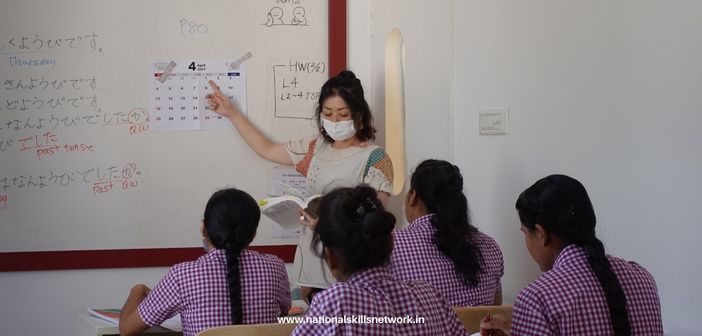“When it comes to learning the Japanese language, there are many related notions that involve body language. This is perhaps the most challenging aspect of learning the Japanese language” said Mr. Rajkumar Sambandham, Managing Director and Chairman, NAVIS HR, while emphasising on the importance of learning Japanese as part of the Technical Intern Training Program (TITP).
To learn more about the TITP program, initiatives from NAVIS HR, the challenges of a Sending Organisation (SO), Japanese language training, in-demand job opportunities in various industries in Japan, and more, we conversed with Mr. Rajkumar Sambandham, Managing Director and Chairman, NAVIS HR, Bengaluru.
Here are the excerpts from our conversation; you can watch the full video interview on our YouTube channel.
Technical Intern Training Program (TITP)
TITP stands for Technical Intern Training Program, a program where individuals are sent to Japan and get employed. The Sending Organisation (SO) is one of the many stakeholders. Sending Organisations (SO) are selected by the government of Japan and the National Skill Development Corporation (NSDC) under the Ministry of Skill Development and Entrepreneurship (MSDE). Currently, there are over 30 Sending Organisations in India striving to assist by sending people to Japan.
The role of three main organisations under TITP:
- Sending Organisation (SO): The Sending Organisation (SO) mobilises the candidates, trains them, and sends them to Japan.
- Supervising Organisation (SVO): The Supervising Organisation (SVO) interacts with the Receiving Organisation (RO). As most Sending Organisations (SO) lack the direct capability of obtaining a Receiving Organisation (RO), they rely on the Supervising Organisation (SVO).
- Receiving Organisation (RO): The Receiving Organisation (RO) are the companies that employ people on an intern visa in Japan.

Japanese Language Training
While elaborating on why NAVIS HR hires Japanese trainers, Mr. Rajkumar Sambandham said, “When the organisation was founded 20 years ago, we understood that if we were to conduct training, it should be done with the help of natives. All of our trainers at NAVIS HR are Japanese, who are recruited, trained and brought to India from Japan.
We sought to conduct Japanese language training using the technique of teaching in the Japanese language by Japanese people. This is to ensure that the candidate puts all of their efforts into communicating in the same language from the beginning of the training program until they graduate.”
Demand for caretakers in Japan
Mr. Rajkumar Sambandham stated, “Japan has a large elderly population. Japan’s average elderly population is 48.8 per cent, compared to ours at 28.7 per cent. Japan has a very high demand for caretakers due to its elderly population. This is one industry that a lot of people are keen on.”
“Also, Japan is foreseeing two problems: the 2025 problem and the 2035 problem. In the year 2025, most Japanese will be over 65 years old, and that will be the peak when more than 50 per cent of the population is over this age. In the year 2035, they will be 75 years old, and out of three people, one will be older than 65 years old. That is the reason there is more demand for the role of a Caretaker,” he added.
Few in-demand industry sectors in Japan
- Construction Industry
- Food and Beverage Industry
- Machinery Industry
- Agriculture Industry
In the coming years, there will be a need for workers in industries such as,
- Healthcare industry
- Food Service Industry
- Hotel Industry
Partnership opportunities with NAVIS HR
Mr. Rajkumar Sambandham said, “Finding the Supervising Organisation (SVO) turned out to be the biggest challenge when we first began as Sending Organizations (SOs). I am aware that this can be difficult for the majority of Sending Organizations (SOs) in India. Because many Supervising Organisations (SVO) cannot supervise Indian resources once they arrive in Japan, this is why we are unable to significantly raise the number.
However, a few Supervising Organisations (SVOs) have recently been looking into how they can get involved. A Supervising Organisation (SVO) must closely adhere to several requirements before supporting any Sending Organisation (SO) from another country.
To increase the capability of supporting Sending Organizations (SOs), we developed a Supervising Organisation (SVO) with the help of many stakeholders and individuals who were interested in India. Therefore, as a Supervising Organisation (SVO), we will be glad to collaborate with different Sending Organisations (SO).
Also read: Opportunities for Indian Youth under Indo-Japan Technical Intern Training Program (TITP) https://nationalskillsnetwork.in/opportunities-for-indian-youth-under-indo-japan-technical-intern-training-program-titp/
The Supervising Organisation (SVO) that we established is known as the 81 Society. We simplified it because many Sending Organizations (SOs) nowadays find it challenging to identify a Supervising Organisation (SVO). Japan’s country code is 81, making it relatively simple for people to remember.”













